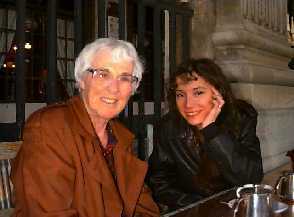                 |
|
Internet
Society |
|
Reproduction du discours de M. Vinton Cerf
President Fondateur de l'Internet
Society
(Genève, le 7 octobre 1995)
 |
Un
extrait du discours de Vinton Cerf
à l'Internet Telecom - Genève 1995 |
:-) |
|
10ème
paragraphe... |
... à propos de l'Internet...
|
«...J'ai aussi à relater
certains effets sociaux plutôt inattendus de cette technologie.
Dès lors qu'il existe tant et tant de moyens de communication,
nous trouvons aujourd'hui un nouveau canal propre à permettre
aux gens de se retrouver, alors qu'autrement ils n'en auraient pas
eu l'occasion. A cet effet, j'ai une anecdote personnelle à vous
raconter : il y a quelques semaines, ma mère, qui a 79 ans et
utilise l'Internet, a reçu un message d'une jeune femme parisienne.
Le nom de ma mère est Muriel Cerf et le nom de cette
jeune femme - un écrivain français, célèbre
- est aussi Muriel Cerf, qui adressait via l'Internet un message à ma
mère, disant: "Bonjour, aurions-nous des liens familiaux?". Après
avoir échangé toutes deux nombre d'informations généalogiques,
ma mère, jeudi dernier, a pris l'avion pour Paris afin de rencontrer
son homonyme. Cela ne serait jamais arrivé si le réseau
et les emails n'étaient pas aujourd'hui aussi développés...»
Vinton Cerf, Genève
1995. |
| |
| |
«...I also have to say
that there are some rather unexpected social effects of this particular
technology. Since it is a many to many communications medium we find
people discovering each other when they would otherwise have no opportunity
to do so. I have one personal anecdote to tell you. A few weeks ago,
my mother, who is 79 years old and who uses the Internet, got an email
message from a woman in Paris. My mother's name is Muriel Cerf. The
woman in Paris, a well known French author, is named Muriel Cerf. She
sent a message to my mother saying "Hello, are we related ?".
Well it wasn't' clear but they exchanged a good deal of genealogical
information and last Thursday my mother flew to Paris to meet her name
sake in Paris, and this would never have happened had there not been
a network and email addresses everywhere...»
Vinton Cerf, Geneva
1995. |
| |
| |
| |
en
effet, en 1995,
les deux Muriel se sont retrouvées
dans les jardins du Palais Royal
en souvenir de Colette |

|
Muriel
Cerf & Muriel Cerf
© D.R. 1995, Paris - France. |
 |
 |
 |
| |
|
|
| 1 |
|
|
| 2 |
|
|
| 3 |
|
|
| 4 |
|
|
| 5 |
|
|
| 6 |
|
|
| 7 |
|
|
| 8 |
|
|
| 9 |
|
|
| 10 |
|
|
| 11 |
|
|
| 12 |
|
|
| 13 |
|
|
| 14 |
|
|
| 15 |
|
|
| 16 |
|
|
| 17 |
|
|
| 18 |
|
|
| 19 |
|
|
| 20 |
|
|
| 21 |
|
|
| 22 |
|
|
| |
|
|
|
|
|
|
|
|
|
Ce site n'engage que la responsabilité de l'auteur et du webmaster.
© 1994 - 2006, Stephane Pietri a.k.a RootCat - All rights reserved - Tous droits réservés.
i.e. versions 1.0 (1994-05) a.ka 27.5.1994 - actual version X 12.01.01 (01/2006)
12ème année - rootcat.net - rootcat@murielcerf.com . updated : 1 1 2006 |
|




















